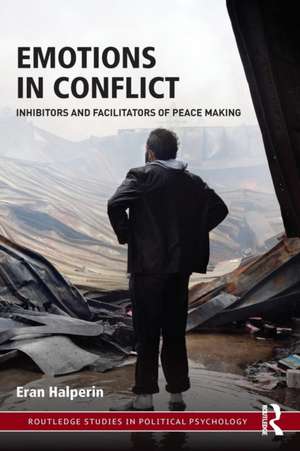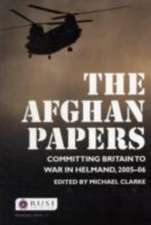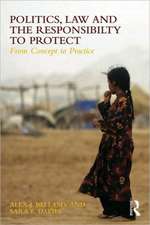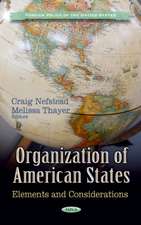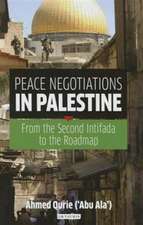Emotions in Conflict: Inhibitors and Facilitators of Peace Making: Routledge Studies in Political Psychology
Autor Eran Halperinen Limba Engleză Paperback – 22 dec 2015
Could identifying the role of discrete emotions in conflicts and conflict resolution potentially provide a wide platform for developing pinpoint conflict resolution interventions?
Using a vast array of primary sources, critical literature analysis, and firsthand personal experiences in various conflict zones (Middle East, Cyprus, Bosnia, and Northern Ireland), Eran Halperin introduces a new perspective on psychological barriers to peace. Halperin focuses on various emotional mechanisms that hamper peace processes, even when parties face real opportunities for conflict resolution. More specifically, he explores how hatred, anger, fear, angst, hope, despair, empathy, guilt, and shame, combined with various emotion regulation strategies, provide emotions-based explanations for people's attitudinal and behavioral reactions to peace-related events during the ongoing process of conflict resolution.
Written in a clear and accessible style, Emotions in Conflict offers a thought-provoking and pioneering insight into the role discrete intergroup emotions play in impeding, as well as facilitating, peace processes in intractable conflicts. This book is essential reading for those who study intractable conflicts and their resolutions, and those who are interested in the ‘real-world’ implication of recent theories and findings on emotion and emotion regulation.
| Toate formatele și edițiile | Preț | Express |
|---|---|---|
| Paperback (1) | 385.19 lei 43-57 zile | |
| Taylor & Francis – 22 dec 2015 | 385.19 lei 43-57 zile | |
| Hardback (1) | 1001.07 lei 43-57 zile | |
| Taylor & Francis – 12 dec 2015 | 1001.07 lei 43-57 zile |
Preț: 385.19 lei
Nou
Puncte Express: 578
Preț estimativ în valută:
73.71€ • 77.15$ • 61.35£
73.71€ • 77.15$ • 61.35£
Carte tipărită la comandă
Livrare economică 31 martie-14 aprilie
Preluare comenzi: 021 569.72.76
Specificații
ISBN-13: 9781138123427
ISBN-10: 1138123420
Pagini: 246
Ilustrații: 3 black & white illustrations, 3 black & white line drawings
Dimensiuni: 152 x 229 x 16 mm
Greutate: 0.35 kg
Ediția:1
Editura: Taylor & Francis
Colecția Routledge
Seria Routledge Studies in Political Psychology
Locul publicării:Oxford, United Kingdom
ISBN-10: 1138123420
Pagini: 246
Ilustrații: 3 black & white illustrations, 3 black & white line drawings
Dimensiuni: 152 x 229 x 16 mm
Greutate: 0.35 kg
Ediția:1
Editura: Taylor & Francis
Colecția Routledge
Seria Routledge Studies in Political Psychology
Locul publicării:Oxford, United Kingdom
Public țintă
Postgraduate and UndergraduateCuprins
Table of Contents: 1. Introduction 2. The Emotion Based Approach to Conflict Resolution – Some Basic Concepts 3. Intergroup Hatred in Intractable Conflicts – The Ultimate Barrier to Peace 4. Intergroup Anger in Intractable Conflicts – Not Exactly What You Had in Mind… 5. Societies under Threat – Collective Fear and Angst as Barriers and (at Times) Catalysts of Peace 6. Is Peace Really an Option? Hope, Despair and the Peace Process 7. Moral Emotions in Intractable Conflicts: Group-Based Guilt, Conflict Resolution and Reconciliation 8. Empathy as a Peace Catalyst in Intractable Conflict: Is It Feasible? Is It Enough? 9. The "Catch 22" of Intractable Conflicts: The Role of Pride and Humiliation in Conflicts and Peace Processes 10. Changing Feelings to Promote Peace: Emotion Regulation as a New Path to Conflict Resolution
Recenzii
'This book provides a detailed, nuanced, and novel perspective on the role of emotions in intergroup conflict and conflict resolution. Drawing on Halperin’s own extensive work in this area and integrating it with other relevant research, this book has the potential to quickly become a classic in the field.'—Johanna Ray Vollhardt, Assistant Professor of Psychology, Clark University
'Although many books have been written about violent conflicts, relatively few focus on the important factor that is also responsible for their eruption, escalation and resolution—namely human emotions. This book by Eran Halperin is a pivotal contribution in closing this lacuna. He originally, eloquently, and comprehensively tackles the issue of emotions in conflict by providing a holistic analysis that not only elaborates on the role of specific emotions, but also and especially provides a holistic conceptual framework of emotions' functioning in the challenging context of intergroup violence.' —Daniel Bar-Tal, Tel Aviv University, Israel
'Although many books have been written about violent conflicts, relatively few focus on the important factor that is also responsible for their eruption, escalation and resolution—namely human emotions. This book by Eran Halperin is a pivotal contribution in closing this lacuna. He originally, eloquently, and comprehensively tackles the issue of emotions in conflict by providing a holistic analysis that not only elaborates on the role of specific emotions, but also and especially provides a holistic conceptual framework of emotions' functioning in the challenging context of intergroup violence.' —Daniel Bar-Tal, Tel Aviv University, Israel
Descriere
Using a vast array of primary sources, critical literature analysis and first hand personal experiences in various conflict zones, Eran Halperin introduces a new perspective on psychological barriers to peace. Halperin focuses on various emotional mechanisms that hamper peace processes, even when parties face real opportunities for conflict resolution. Written in a clear and accessible style, Emotions in Conflict offers a thought provoking and pioneering insight into the role discrete intergroup emotions play in impeding, as well as facilitating, peace process in intractable conflicts.
